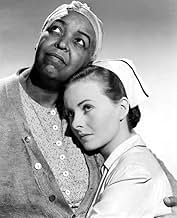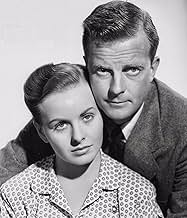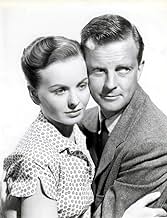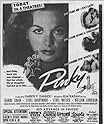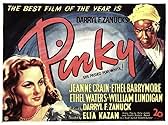IMDb-BEWERTUNG
7,2/10
3645
IHRE BEWERTUNG
Füge eine Handlung in deiner Sprache hinzuA light-skinned black woman falls in love with a white doctor, though he is unaware of her true race.A light-skinned black woman falls in love with a white doctor, though he is unaware of her true race.A light-skinned black woman falls in love with a white doctor, though he is unaware of her true race.
- Für 3 Oscars nominiert
- 3 Gewinne & 4 Nominierungen insgesamt
Fred Aldrich
- Townsman
- (Nicht genannt)
Shelby Bacon
- Boy
- (Nicht genannt)
Betty Beard
- Minor Role
- (Nicht genannt)
Rene Beard
- Teejore
- (Nicht genannt)
Arthur Berkeley
- Townsman
- (Nicht genannt)
Patsy Boniface
- Minor Role
- (Nicht genannt)
Mildred Boyd
- Nurse
- (Nicht genannt)
Empfohlene Bewertungen
We'll know we've "arrived" when people can get past the casting of Jeanne Crain as a woman of color. There ARE mixed race women who are as light as Jeanne Crain, but because of the "one drop rule," in 1949 they were, and often still today are -considered "black." In today's multi-cultural society these women often embrace their heritage, but the issues they face remain sadly the same today in many facets. Example: African Americans who are educated are often told they are "talking white."
There is a reason that "she's passing" became an understood term. Very light skinned women & men in the early part of the 1900s DID try to do what Pinky here does.
I was really encouraged to see the scene with Nina Mae McKinney next to Frederick O'Neal, next to Jeanne Crain, all playing "black folks." THAT is the reality of miscegenation in the South, and that is what people still have trouble with: sometimes race is not just black and white. It is uncomfortable and true. (McKinney is marvelous, and fills every second of her screen time, whether she is removing a pebble from her shoe or coyly playing piano on top of a fence.)
I sadly find this film completely relevant today. These conversations of segregation and intermarriage are STILL going strong. There are African Americans who talk about "white women taking our men" or people of all races saying, "stay with your own race." This is segregationist, this is racist, and it still exists very strongly in all racial communities.
Dorothy Dandridge and Lena Horne- both beautiful & talented - are often mentioned as possible contenders for this role. They simply were NOT light enough to pass for white, it hampered their careers, and they have both acknowledged that. Hollywood in general likes their races obvious, casting is still largely done by type and stereotype, no matter what race even today it would be hard to find an actress of stature who identifies herself as black, but who can totally pass as white; the market doesn't hire these women.
Type casting is still the norm. Even my dark skinned actress friends have been told they don't "talk black enough" in auditions. Ethel Waters and Ethel Barrimore here, both fine actresses at the top of their game, were both type cast here in roles that they've basically played several times before; it is only the script context that made this special.
Jeanne Crain had enormous courage to portray this role. Not only is she perpetually faulted for being a white woman playing this role, but she risked her career, some people questioned her heritage in a racist age. That is a tribute to the reality and sensitivity she brought to the role, and her acting, which is often maligned because she had reserve. Her "under acting" is actually the preferred style today in TV and film. She was ahead of her time.
Part of why Crain is not liked much today is that she was a 40s type that is not valued today. Restrained, ladylike, mature in mindset, "high minded" - this is what she represented, and these things are not looked for in leading ladies today. What she represents has gone out of fashion; it was going out of fashion even then, and Kazan valued grittier, dirtier types like Brando. Kazan, who initially labeled her an impassive beauty queen, eventually credited her fine work.
This movie is sensitively done in all respects with really great performances top to bottom. It is not glossy or simple, neither race is solely good or solely bad. It is a disservice to have the only DVD commentary done by someone who clearly still does not like the film and doesn't appreciate the complexity of Crain's work here. That a New Yorker thought the court trial didn't look real because people were all fanning themselves shows he has never spent time in the south in a public gathering place.
This film is galling and aggravating, and unfortunately still very real. This is not a fun film, it is a great film, that speaks just as much to attitudes held today as it did then.
There is a reason that "she's passing" became an understood term. Very light skinned women & men in the early part of the 1900s DID try to do what Pinky here does.
I was really encouraged to see the scene with Nina Mae McKinney next to Frederick O'Neal, next to Jeanne Crain, all playing "black folks." THAT is the reality of miscegenation in the South, and that is what people still have trouble with: sometimes race is not just black and white. It is uncomfortable and true. (McKinney is marvelous, and fills every second of her screen time, whether she is removing a pebble from her shoe or coyly playing piano on top of a fence.)
I sadly find this film completely relevant today. These conversations of segregation and intermarriage are STILL going strong. There are African Americans who talk about "white women taking our men" or people of all races saying, "stay with your own race." This is segregationist, this is racist, and it still exists very strongly in all racial communities.
Dorothy Dandridge and Lena Horne- both beautiful & talented - are often mentioned as possible contenders for this role. They simply were NOT light enough to pass for white, it hampered their careers, and they have both acknowledged that. Hollywood in general likes their races obvious, casting is still largely done by type and stereotype, no matter what race even today it would be hard to find an actress of stature who identifies herself as black, but who can totally pass as white; the market doesn't hire these women.
Type casting is still the norm. Even my dark skinned actress friends have been told they don't "talk black enough" in auditions. Ethel Waters and Ethel Barrimore here, both fine actresses at the top of their game, were both type cast here in roles that they've basically played several times before; it is only the script context that made this special.
Jeanne Crain had enormous courage to portray this role. Not only is she perpetually faulted for being a white woman playing this role, but she risked her career, some people questioned her heritage in a racist age. That is a tribute to the reality and sensitivity she brought to the role, and her acting, which is often maligned because she had reserve. Her "under acting" is actually the preferred style today in TV and film. She was ahead of her time.
Part of why Crain is not liked much today is that she was a 40s type that is not valued today. Restrained, ladylike, mature in mindset, "high minded" - this is what she represented, and these things are not looked for in leading ladies today. What she represents has gone out of fashion; it was going out of fashion even then, and Kazan valued grittier, dirtier types like Brando. Kazan, who initially labeled her an impassive beauty queen, eventually credited her fine work.
This movie is sensitively done in all respects with really great performances top to bottom. It is not glossy or simple, neither race is solely good or solely bad. It is a disservice to have the only DVD commentary done by someone who clearly still does not like the film and doesn't appreciate the complexity of Crain's work here. That a New Yorker thought the court trial didn't look real because people were all fanning themselves shows he has never spent time in the south in a public gathering place.
This film is galling and aggravating, and unfortunately still very real. This is not a fun film, it is a great film, that speaks just as much to attitudes held today as it did then.
Black people "passing for white" was not a new topic for Hollywood in 1949. It was part of the plot of "Imitation of Life" in 1934, but in that film, an actual black actress, Fredi Washington, played the role of the young woman who "passes" in the white world. In 1949, there were two films dealing with this issue: "Pinky" and "Lost Boundaries," and in both cases, the black person was played by a white actor.
"Pinky" stars Jeanne Crain as Pinky Johnson, a black woman who looks white, so much so that she when she studies nursing in New York, she easily enters the white world and becomes involved with a white doctor who wants to marry her. Needing time to think over her situation, she returns home, which is a shack where her grandmother (Ethel Waters) lives in a black section of their southern town. There she is reminded of the prejudice and cruelty she left. When her grandmother asks her to care for an elderly white woman (Ethel Barrymore), hostility between patient and nurse leads to an uneasy bond.
This is a brilliant film all the way, magnificently directed by Elia Kazan and produced by Darryl F. Zanuck, who loved taking on these controversial social issues. The acting is superb: Jeanne Crain gives the best performance of her career as a woman who comes to grips with her true identity. She is so dignified as she walks through the town, soft-spoken yet strong, refusing to come down to the level of those around her. Ethel Barrymore is the elderly terminally ill woman Pinky reluctantly agrees to care for, and she nearly steals the movie with a no-nonsense performance. She's a woman set in her ways and opinions, but she's fair person who can see the human soul. It's probably the best drawn character in the film.
As a teen-aged fan of "Route 66," I can well remember the publicity around the show when Ethel Waters guest-starred. Of course white teens in the '60s had no idea of who she was or the circumstances of her life and career. Yet to this day I can remember her on that show. Forty years later, thankfully, I have an appreciation of her place in history and her work. Waters gives a powerful performance. Her character has accepted her lot in life but sacrifices everything so that her grandchild can have a better one. In her world, white men have the power, and you can clearly see her belief manifested in her courtroom demeanor.
The casting of Jeanne Crain is a sticking point here but not really when looked at in the context of the 1940s. Even with this casting, this is a bold movie, uncompromising in its depiction of white attitudes and racial slurs. It is just a pity that at the time of the filming, Fredi Washington was 45 years old and actually no longer in films. Washington looked so white that she was told by producers that if she would agree to "pass" and play white roles, she could have a career equal to that of Norma Shearer. She refused, and in order to play black women, she had to darken her skin. Lena Horne was deemed not white-looking enough. I suggest that the same is true for the beautiful Dorothy Dandridge. There may have been black actresses who looked white enough to play this role, but would anyone have answered such a casting call? Most importantly, "Pinky" would not have been made without Jeanne Crain, because Zanuck wanted her to do it, and it's a film that deserved making. The other sticking point in the film is Pinky's fiancée, a white doctor. His easy acceptance of her as black - and the fact that she kept it from him - is a weakness in the script. This was done perhaps to highlight that he wanted to her to continue to pass for white, therefore making it clear that Pinky has to the make the decision, but the scenario does not seem believable.
You can predict the ending of "Pinky," and despite complaints that it's a typically neat Hollywood one, I found it immensely satisfying as I found the entire experience of watching this truly classic film, "Pinky."
"Pinky" stars Jeanne Crain as Pinky Johnson, a black woman who looks white, so much so that she when she studies nursing in New York, she easily enters the white world and becomes involved with a white doctor who wants to marry her. Needing time to think over her situation, she returns home, which is a shack where her grandmother (Ethel Waters) lives in a black section of their southern town. There she is reminded of the prejudice and cruelty she left. When her grandmother asks her to care for an elderly white woman (Ethel Barrymore), hostility between patient and nurse leads to an uneasy bond.
This is a brilliant film all the way, magnificently directed by Elia Kazan and produced by Darryl F. Zanuck, who loved taking on these controversial social issues. The acting is superb: Jeanne Crain gives the best performance of her career as a woman who comes to grips with her true identity. She is so dignified as she walks through the town, soft-spoken yet strong, refusing to come down to the level of those around her. Ethel Barrymore is the elderly terminally ill woman Pinky reluctantly agrees to care for, and she nearly steals the movie with a no-nonsense performance. She's a woman set in her ways and opinions, but she's fair person who can see the human soul. It's probably the best drawn character in the film.
As a teen-aged fan of "Route 66," I can well remember the publicity around the show when Ethel Waters guest-starred. Of course white teens in the '60s had no idea of who she was or the circumstances of her life and career. Yet to this day I can remember her on that show. Forty years later, thankfully, I have an appreciation of her place in history and her work. Waters gives a powerful performance. Her character has accepted her lot in life but sacrifices everything so that her grandchild can have a better one. In her world, white men have the power, and you can clearly see her belief manifested in her courtroom demeanor.
The casting of Jeanne Crain is a sticking point here but not really when looked at in the context of the 1940s. Even with this casting, this is a bold movie, uncompromising in its depiction of white attitudes and racial slurs. It is just a pity that at the time of the filming, Fredi Washington was 45 years old and actually no longer in films. Washington looked so white that she was told by producers that if she would agree to "pass" and play white roles, she could have a career equal to that of Norma Shearer. She refused, and in order to play black women, she had to darken her skin. Lena Horne was deemed not white-looking enough. I suggest that the same is true for the beautiful Dorothy Dandridge. There may have been black actresses who looked white enough to play this role, but would anyone have answered such a casting call? Most importantly, "Pinky" would not have been made without Jeanne Crain, because Zanuck wanted her to do it, and it's a film that deserved making. The other sticking point in the film is Pinky's fiancée, a white doctor. His easy acceptance of her as black - and the fact that she kept it from him - is a weakness in the script. This was done perhaps to highlight that he wanted to her to continue to pass for white, therefore making it clear that Pinky has to the make the decision, but the scenario does not seem believable.
You can predict the ending of "Pinky," and despite complaints that it's a typically neat Hollywood one, I found it immensely satisfying as I found the entire experience of watching this truly classic film, "Pinky."
I saw this film some years after it came out, in a Texas Baptist orphans home, as a preadolescent. In the years to follow, I developed a fascination for Ethel Waters, esp. when I saw her interpretation of Carson McCuller's "A Member of the Wedding".
When I saw the film tonight on American Movie Classics, a lot of years had passed since first having seen it. Ethel Waters' performance struck me as cowed and subservient. In the court scene while being questioned by the plaintiff's council, she actually flinched when he raised his voice. ...And I'm thinking, 'Damn, that woman is really intimidated.' Having read her autobio, as well as a bio on her, I'm aware that not one woman in a million suffered through a similar childhood: a b*****d born of a 13-year-old rape victim - unwanted and shuffled from pillar to post to eventually become a washerwoman...it's a wonder she survived.
Yet survive she did. Not surprisingly, she had a monster chip on her shoulder. It is my understanding that John Ford, the man who was to direct "Pinky", had such a run-in with Miss Waters that he quit, and Kazan took over. The word is that neither could stand the sight of the other.
The movie is an important one - and I'd like to think that the reason goes beyond the juxtapositioning of America's treatment of blacks in the Forties with today's suffocating PC standards. There is the understated acting, for one thing. Ethel Barrymore always played the dignified albiet intimidating elderly lady in her later years. Yet in "Pinky", she is strong without being absurdly powerful. How well that woman delivers her lines...!
What I also liked was, while the white majority were unkind to Pinky, I can attest as a Southerner (well, Texan), that Kazan presented them truthfully. He only demonized one woman: the older cousin-plaintiff.
It is surprising that this film wasn't presented in a more gritty format; that there wasn't more preaching in it, that it wasn't condescending to whites. None of these failings mar this splendid film. Forty years after having seen it, I realize a superb gentleness that isn't to be found in American films. At a guess, that's because a generation ago most films were made for 30-and-over adults, whereas today they're almost exclusively made for 13 - 25 year olds.
I will give "Pinky" my highest compliment: It is literary.
When I saw the film tonight on American Movie Classics, a lot of years had passed since first having seen it. Ethel Waters' performance struck me as cowed and subservient. In the court scene while being questioned by the plaintiff's council, she actually flinched when he raised his voice. ...And I'm thinking, 'Damn, that woman is really intimidated.' Having read her autobio, as well as a bio on her, I'm aware that not one woman in a million suffered through a similar childhood: a b*****d born of a 13-year-old rape victim - unwanted and shuffled from pillar to post to eventually become a washerwoman...it's a wonder she survived.
Yet survive she did. Not surprisingly, she had a monster chip on her shoulder. It is my understanding that John Ford, the man who was to direct "Pinky", had such a run-in with Miss Waters that he quit, and Kazan took over. The word is that neither could stand the sight of the other.
The movie is an important one - and I'd like to think that the reason goes beyond the juxtapositioning of America's treatment of blacks in the Forties with today's suffocating PC standards. There is the understated acting, for one thing. Ethel Barrymore always played the dignified albiet intimidating elderly lady in her later years. Yet in "Pinky", she is strong without being absurdly powerful. How well that woman delivers her lines...!
What I also liked was, while the white majority were unkind to Pinky, I can attest as a Southerner (well, Texan), that Kazan presented them truthfully. He only demonized one woman: the older cousin-plaintiff.
It is surprising that this film wasn't presented in a more gritty format; that there wasn't more preaching in it, that it wasn't condescending to whites. None of these failings mar this splendid film. Forty years after having seen it, I realize a superb gentleness that isn't to be found in American films. At a guess, that's because a generation ago most films were made for 30-and-over adults, whereas today they're almost exclusively made for 13 - 25 year olds.
I will give "Pinky" my highest compliment: It is literary.
It is not very "in" to like Elia Kazan right now, because he named names in the McCarthy witch-hunts and just received an honorary Oscar, but what a brilliant director he was. And if he didn't show much courage in the Fifties, he sure did in the Forties when he tackled racial prejudice head-on in two excellent movies: "Gentleman's Agreement" and "Pinky" (John Ford is said to have chickened-out of directing this one). "Pinky" is not as good as "Gentleman's Agreement", but it ain't half bad either. Here we see a deeply prejudiced South where black girls are attacked on the streets and shops refuse them service. The scenes are realistic, even brutally filmed, and the language strong for its day.
I'm sure Kazan must have been dismayed to have been given a Hollywood starlet to play the complex lead character - a black woman who looks white - but he managed to extract a damn good performance out of Jeanne Crain. The supporting cast is flawless, down to the smallest role. Kazan knew how to direct actors. Evelyn Varden deserves special mention as a vicious Southern matron. But the most praise must be reserved for the two Ethels - Waters and Barrymore - who are nothing short of brilliant.
Okay, the ending's a little dicky, and predictable, but the intentions of the film-makers are sincere and the results must have been revolutionary in 1949. I love the way Kazan shoots his movies too - long unbroken sequences and tracking shots, and excellent use of light and shadow - both of which probably coming from his stage experience. Kazan combined a strong ability to work with actors and a keen cinematic eye to create some of the best dramatic films of the century. And "Pinky" is one of these.
I'm sure Kazan must have been dismayed to have been given a Hollywood starlet to play the complex lead character - a black woman who looks white - but he managed to extract a damn good performance out of Jeanne Crain. The supporting cast is flawless, down to the smallest role. Kazan knew how to direct actors. Evelyn Varden deserves special mention as a vicious Southern matron. But the most praise must be reserved for the two Ethels - Waters and Barrymore - who are nothing short of brilliant.
Okay, the ending's a little dicky, and predictable, but the intentions of the film-makers are sincere and the results must have been revolutionary in 1949. I love the way Kazan shoots his movies too - long unbroken sequences and tracking shots, and excellent use of light and shadow - both of which probably coming from his stage experience. Kazan combined a strong ability to work with actors and a keen cinematic eye to create some of the best dramatic films of the century. And "Pinky" is one of these.
I've just seen this film for the 3rd time although I'm sure I hadn't seen it for at least 10 years. I had forgotten the depth and intensity of the prejudice displayed in the film. It is taking nothing away from Jeanne Craine's sensitive and beautiful performance to say that the star of the film is Ethel Waters - she is simply a magnificent presence throughout. It is one of those performances where every fibre of being is transmitted thru to the viewer - you cannot help but feel that the character is one of the strongest and bravest women ever shown on screen. Considering the shocking 1950's world of Amos and Andy and the in-every-sense-white-bread fiction world of Hollywood - Father Knows Best, The Donna Reed Show, etc - it is startling to see how movies so transcended the comfort-food level of TV and challenged audiences. This movie belongs, I believe, in the highest echelon of social commentary films - such as To Kill a Mockingbird, Gentlemen's Agreement. Absolute must see!!!
Wusstest du schon
- WissenswertesJohn Ford was the original director of the film but after seeing dailies, Darryl F. Zanuck felt Ford wasn't connecting with the material. Zanuck called Elia Kazan in New York and asked him to take over the film. Kazan felt he owed Zanuck for his film career and agreed to do the movie without even looking at the script. He flew to Los Angeles and started filming the next Monday.
- PatzerWhen the white officer slaps Rozelia on the left side of her face, she mistakenly rubs the right side of her face.
- Zitate
Pinky Johnson: I'm a Negro. I can't forget it, and I can't deny it. I can't pretend to be anything else, and I don't want to be anything else. Don't you see, Tom?
Dr. Thomas Adams: No, I don't.
Pinky Johnson: You can't live without pride.
- VerbindungenFeatured in Biography: Darryl F. Zanuck: 20th Century Filmmaker (1995)
Top-Auswahl
Melde dich zum Bewerten an und greife auf die Watchlist für personalisierte Empfehlungen zu.
- How long is Pinky?Powered by Alexa
Details
- Erscheinungsdatum
- Herkunftsland
- Sprache
- Auch bekannt als
- Lo que la carne hereda
- Drehorte
- Produktionsfirma
- Weitere beteiligte Unternehmen bei IMDbPro anzeigen
Box Office
- Bruttoertrag in den USA und Kanada
- 4.200.000 $
- Laufzeit
- 1 Std. 42 Min.(102 min)
- Farbe
- Seitenverhältnis
- 1.37 : 1
Zu dieser Seite beitragen
Bearbeitung vorschlagen oder fehlenden Inhalt hinzufügen


